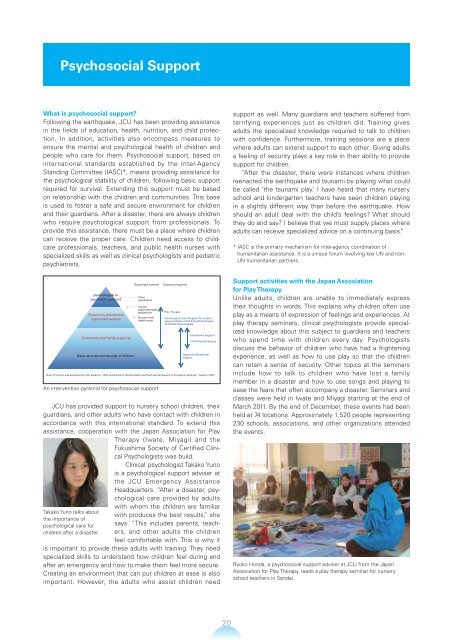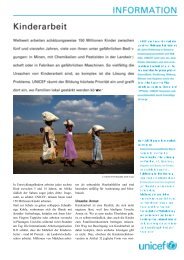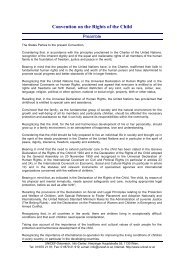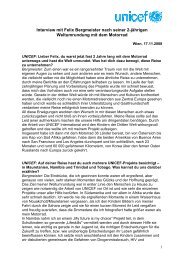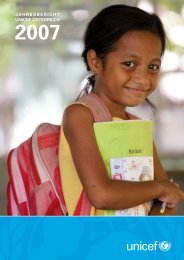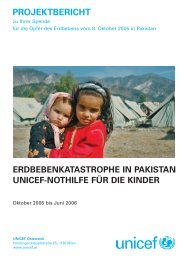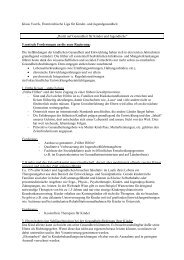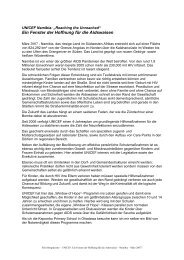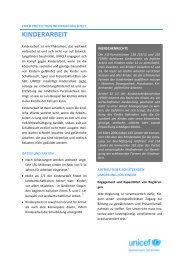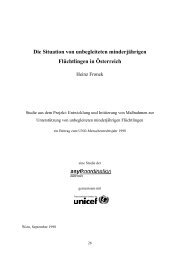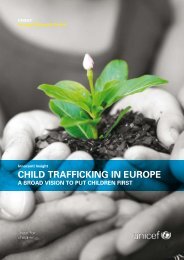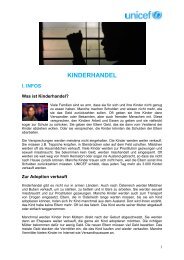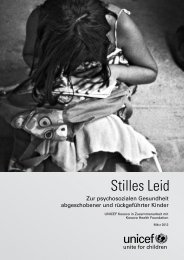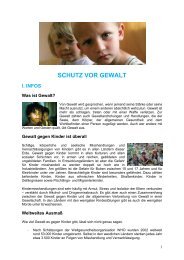You also want an ePaper? Increase the reach of your titles
YUMPU automatically turns print PDFs into web optimized ePapers that Google loves.
Psychosocial Support<br />
What is psychosocial support?<br />
Following the earthquake, JCU has been providing assistance<br />
in the fields of education, health, nutrition, and child protection.<br />
In addition, activities also encompass measures to<br />
ensure the mental and psychological health of children and<br />
people who care for them. Psychosocial support, based on<br />
international standards established by the Inter-Agency<br />
Standing Committee (IASC)*, means providing assistance for<br />
the psychological stability of children, following basic support<br />
required for survival. Extending this support must be based<br />
on relationship with the children and communities. This base<br />
is used to foster a safe and secure environment for children<br />
and their guardians. After a disaster, there are always children<br />
who require psychological support from professionals. To<br />
provide this assistance, there must be a place where children<br />
can receive the proper care. Children need access to childcare<br />
professionals, teachers, and public health nurses with<br />
specialized skills as well as clinical psychologists and pediatric<br />
psychiatrists.<br />
psychological or<br />
psychiatric supports<br />
Support by trained and<br />
supervised workers<br />
Community and family supports<br />
Basic services and security of children<br />
Child<br />
psychiatrist<br />
Clinical<br />
psychotherapist,<br />
pediatrician<br />
Nursery staff,<br />
health nurse<br />
Note: This chart was developed by JCU based on “IASC Guidelines on Mental Health and Psychosocial Support in Emergency Settings,” issued in 2007.<br />
An intervention pyramid for psychosocial support<br />
JCU has provided support to nursery school children, their<br />
guardians, and other adults who have contact with children in<br />
accordance with this international standard. To extend this<br />
assistance, cooperation with the Japan Association for Play<br />
Therapy (Iwate, Miyagi) and the<br />
Fukushima Society of Certified Clinical<br />
Psychologists was build.<br />
Clinical psychologist Takako Yuno<br />
is a psychological support adviser at<br />
the JCU Emergency Assistance<br />
Headquarters. “After a disaster, psychological<br />
care provided by adults<br />
Takako Yuno talks about<br />
the importance of<br />
psychological care for<br />
children after a disaster<br />
(Supervised workers) (Support programs)<br />
Play Therapy<br />
Psychological Care Program for nursery<br />
school children of the Fukushima Society<br />
of Clinical Psychologists<br />
Educational Support<br />
Child‐Friendly Spaces<br />
Health and Nutritional<br />
Support<br />
with whom the children are familiar<br />
with produces the best results,” she<br />
says. “This includes parents, teachers,<br />
and other adults the children<br />
feel comfortable with. This is why it<br />
is important to provide these adults with training. They need<br />
specialized skills to understand how children feel during and<br />
after an emergency and how to make them feel more secure.<br />
Creating an environment that can put children at ease is also<br />
important. However, the adults who assist children need<br />
20<br />
support as well. Many guardians and teachers suffered from<br />
terrifying experiences just as children did. Training gives<br />
adults the specialized knowledge required to talk to children<br />
with confidence. Furthermore, training sessions are a place<br />
where adults can extend support to each other. Giving adults<br />
a feeling of security plays a key role in their ability to provide<br />
support for children.<br />
“After the disaster, there were instances where children<br />
reenacted the earthquake and tsunami by playing what could<br />
be called ‘the tsunami play.’ I have heard that many nursery<br />
school and kindergarten teachers have seen children playing<br />
in a slightly different way than before the earthquake. How<br />
should an adult deal with the child’s feelings? What should<br />
they do and say? I believe that we must supply places where<br />
adults can receive specialized advice on a continuing basis.”<br />
* IASC is the primary mechanism for inter-agency coordination of<br />
humanitarian assistance. It is a unique forum involving key UN and non-<br />
UN humanitarian partners.<br />
Support activities with the Japan Association<br />
for Play Therapy<br />
Unlike adults, children are unable to immediately express<br />
their thoughts in words. This explains why children often use<br />
play as a means of expression of feelings and experiences. At<br />
play therapy seminars, clinical psychologists provide specialized<br />
knowledge about this subject to guardians and teachers<br />
who spend time with children every day. Psychologists<br />
discuss the behavior of children who have had a frightening<br />
experience, as well as how to use play so that the children<br />
can retain a sense of security. Other topics at the seminars<br />
include how to talk to children who have lost a family<br />
member in a disaster and how to use songs and playing to<br />
ease the fears that often accompany a disaster. Seminars and<br />
classes were held in Iwate and Miyagi starting at the end of<br />
March 2011. By the end of December, these events had been<br />
held at 74 locations. Approximately 1,520 people representing<br />
230 schools, associations, and other organizations attended<br />
the events.<br />
Ryoko Honda, a psychosocial support adviser at JCU from the Japan<br />
Association for Play Therapy, leads a play therapy seminar for nursery<br />
school teachers in Sendai.


